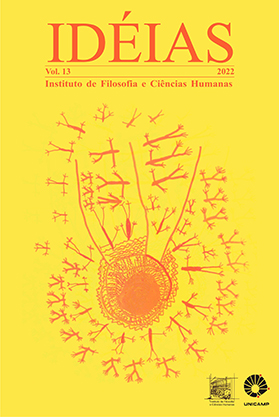Abstract
The present text aims to debate the potential of the conceptual framework produced on the relationship between technique and culture by Simondon, in order to approach contemporary movements that have in the practices of open design and local manufacturing based on the use of control machines. computerized numerical system its main features. I begin by presenting a brief history and the main characteristics and differences between the different spaces of local manufacturing. Then I approach the notion of open design from an encyclopedic perspective according to the perspective that Simondon gives to this historical phenomenon. Finally, from “The mode of existence of technical objects” and “On technique” I seek to discuss the politicization of technical action in the context of these emerging spaces of computerized technical action.
References
ANDERSON, Chris. Makers: a Nova Revolução Industrial. Rio de Janeiro: Elsevier, 2012.
ATANASOSKI, Neda & VORA, Kalindi. Surrogate humanity: race, robots, and politics of technological futures. London: Duke University Press, 2019.
BARRY, Andrew. Political Machines: governing a technological Society. London: Bloomsbury Publishing, 2001.
BENJAMIN, Ruha. Captivating Technology: race, carceral technoscience, and liberatory imagination in everyday life. London: Duke University Press, 2019.
BONTEMSN, Vincent. Gilbert Simondon ou l’invention du futur (Colloque de Cerisy). Cerisy: Éditions Klincksieck, 2016.
CABEZA, Edison Uriel Rodriguez; MOURA, Mônica; ROSSI, Dorival. Design aberto: prática projetual para a transformação social. Strategic Design Research Journal, 7(2): 56-65 May-August 2014.
CAMPOS, Paulo Eduardo Fonseca & DIAS, Henrique José dos Santos. A insustentável neutralidade da tecnologia: o dilema do movimento maker e dos fab labs. Liinc em Revista, Rio de Janeiro, v.14, n.1, p. 33-46, maio 2018.
CUARTIELLES, David and SÁEZ, César García. "From Hacking to Making: The Commodification of Spanish DIY Spaces Since the 1990s" Digital Culture & Society, vol. 6, no. 1, 2020, p. 85-106. https://doi.org/10.14361/dcs-2020-0105
DARDOT, Pierre & LAVAL, Christian. A nova razão do mundo: ensaios sobre a sociedade neoliberal. São Paulo: Boitempo, 2016.
ERSHENFELD, N.; GERSHENFELD, A.; CUTCHER-GERSHENFELD, J. Designing Reality: How to Survive and Thrive in the Third Digital Revolution. [s.l.] Basic Books, 2017.
EYCHENNE, F. & NEVES, H. Fab Lab: a vanguarda da nova revolução industrial. São Paulo: Editorial Fab Lab Brasil, 2013.
FANON, Franz. Pele negra, máscaras brancas. Salvador: EDUFBA, 2008.
FISHER, Mark. Realismo capitalista: é mais fácil imaginar o fim do mundo do que o fim do capitalismo? São Paulo: Autonoma Libertária, 2020.
GERSHENFELD, Neil; GERSHENFELD, Alan; CUTCHER-GERSHENFELD, Joel. Fab-Designing Reality: How to Survive and Thrive in the Third Digital Revolution. New York: Basic Books, 2017.
HIMANEN, Pekka. A ética dos hackers: e o espírito da era da informação. Rio de Janeiro: Campus, 2001.
HUGHES, Thmas Parke. The Evolution of large technological systems. In: BIJKER, Wiebe E.; HUGHES, Thomas Parke; PINCH, Trevor J. The social construction of technological systems: new directions on the sociology and history of technology. Cambridge: The MIT Press, 1989.
INTITUTO FABER-LUDENS. Design livre. São Paulo: Clube dos Autores, 2012.
JASANOFF, Sheila & KIM, Sang-Hyun (eds). Dreamscapes of modernity: sociotechnical imaginaries and the fabrication of power. Chicago: The University of Chicago Press, 2015.
LAFUENTE, Antonio. Laboratorio de Aprendizaje Radical. 2019. Disponível em: https://www.academia.edu/41172428/Laboratorio_de_Aprendizaje_Radical. Acesso em: 7 ago. 2020.
LAFUENTE, Antonio. Sentidos de um laboratório cidadão. 2017. Disponível em: https://pimentalab.milharal.org/2017/12/12/sentidos‑de‑um‑laboratorio‑cidadao‑por‑antonio‑lafuente
LARKIN, Brian. Políticas e poéticas da infraestrutura. Revista ANTHROPOLÓGICAS Ano 24, 31(2): 28-60, 2020.
MOROZOV, Evgeny & BRIA, Francesca. A cidade inteligente: tecnologias urbanas e democracia. São Paulo: Ubu Editora, 2019.
PARRA, Henrique Zoqui Martins. Laboratório tecnopolítico do Comum: protótipos, reticulação e potência da situação. doispontos: Curitiba, São Carlos, volume 16, número 3, p. 111-120, julho de 2019.
PASCALE, Pablo. Laboratorios de Innovación Ciudadana: nueva institucionalidad para un futuro sostenible. Revista Pensamiento Iberoamericano, nº 6, 2018, p. 63-72.
PASQUINELLI, Matteo & VLADAN, Joler. O Manifesto Nooscópio: inteligência artificial como instrumento de extrativismo do conhecimento. 2020. Disponível em: http://lavits.org/o-manifesto-nooscopio-inteligencia-artificial-como-instrumento-de-extrativismo-do-conhecimento/?lang=pt. Acesso em: 7 ago. 2020.
RIFKIN, Jeremy. Sociedade com custo marginal zero: a internet das coisas, os bens comuns e o eclipse do capitalismo. São Paulo: M. Books do Brasil Editora Ltda., 2016.
SIMONDON, Gilbert. Do modo de existência dos objetos técnicos. Rio de Janeiro: Contraponto, 2020.
SIMONDON, Gilbert. Sobre la técnica: 1953-1983. Ciudad Autónoma de Buenos Aires: Cactus, 2017.
SMITH, Adrian; FRESSOLI, Mariano; ABROL, Dinesh; AROND, Elisa; ELY, Adrian. Grassroots innovation movements. New York: Routledge, 2017.
SÖDERBERG, J. The unmaking of the working class and the rise of the Maker. Disponível em: https://snuproject.wordpress.com/2013/01/04/ the-unmaking-of-the-working-class-and-the-rise-of-the-maker-re-public/. Acesso em: 20 dez. 2021.
THOMAS, Douglas. Hacker culture. Minneapolis: University of Minnesota Press, 2002.

This work is licensed under a Creative Commons Attribution-NonCommercial-ShareAlike 4.0 International License.
Copyright (c) 2022 Ideias

